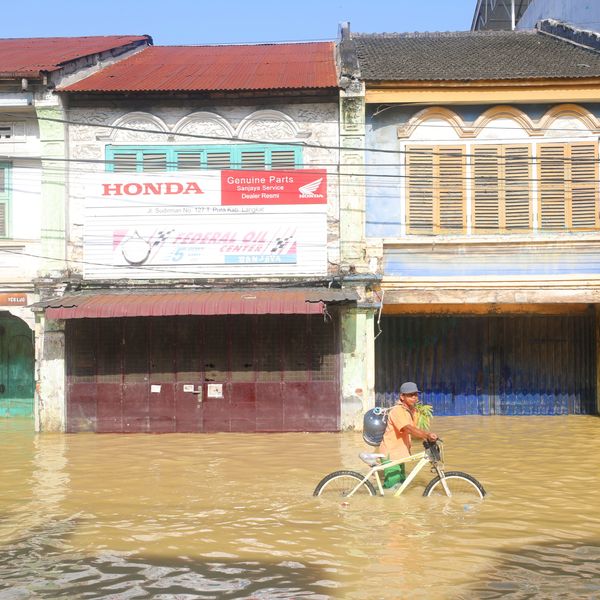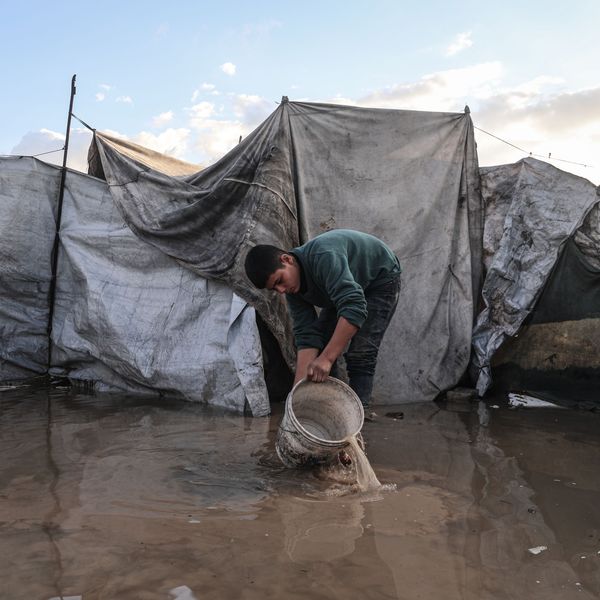
Rescue workers search for survivors in a collapsed house in Moulay Brahim, Al Haouz province, on September 9, 2023, after an earthquake. Morocco's deadliest earthquake in decades has killed at least 820 people, officials said on September 9, causing widespread damage and sending terrified residents and tourists scrambling to safety in the middle of the night.
Over 1,000 Dead From Devastating Earthquake in Morocco
Death toll expected to climb as emergency workers search for survivors in Marrakesh and other impacted villages and cities.
This is a developing story... Check back for updates...
The strongest earthquake to hit the country of Morocco in more than 120 years has left over 800 people dead and many thousands more trapped, missing, or injured.
The quake registered 6.8 on the Richter scale with the epicenter located in the Atlas Mountains and not far the city of Marrakesh where historic buildings—many built of mortar and stone not designed to withstand such tremors—collapsed and the streets filled with people overnight trying to flee the destruction and danger.
"The problem is that where destructive earthquakes are rare, buildings are simply not constructed robustly enough to cope with strong ground shaking, so many collapse resulting in high casualties," Bill McGuire, professor emeritus of geophysical and climate hazards at University College London, told the Associated Press. "I would expect the final death toll to climb into the thousands once more is known. As with any big quake, aftershocks are likely, which will lead to further casualties and hinder search and rescue."
Morocco's interior ministry put the death toll at 822 as of Saturday morning, with 672 injured, but later revised those numbers to reflect that over 1,000 people are confirmed dead and more than 1,200 injured. Both numbers are almost certain to keep rising. Though the stronger impacts were closer to Marakesh, the earthquake was felt across the country, including in Casablance, Essaouira, and the capital city of Rabat.
Large nations, including both the United States and China, sent their well wishes to the people of Morocco.
"I am deeply saddened by the loss of life and devastation caused by the earthquake in Morocco," said U.S. President Joe Biden in an overnight statement. "Our thoughts and prayers are with all those impacted by this terrible hardship."
Biden said his administration as in contact with Moroccan officials and willing to send whatever help might be necessary. "We are working expeditiously to ensure American citizens in Morocco are safe," Biden said, "and stand ready to provide any necessary assistance for the Moroccan people."
"On behalf of the Chinese government and people, I would like to express my deep grief for the victims and sincere condolences to the families," said China's President Xi Jinping.
Dr. Mohammad Kashani, associate professor of structural and earthquake engineering at the University of Southampton, spoke with the Guardian to offer his analysis of the disaster.
"The earthquake was magnitude 6.8 with 18.5km depth, which is quite shallow," explained Kashani. "The shallow earthquakes are normally more destructive. The location is at the boundary of the Eurasian and African plates. Almost all earthquakes occur at the boundary of tectonic plates due to their movement."
"It is too early to see the extent of damage," he continued. "However, from what I’ve seen in photos and videos this very similar to the earthquake that occurred in February in Turkey. The area is full of old and historical buildings, which are mainly masonry. The collapsed reinforced concrete structures that I saw in the photos were either old or substandard."
An Urgent Message From Our Co-Founder
Dear Common Dreams reader, The U.S. is on a fast track to authoritarianism like nothing I've ever seen. Meanwhile, corporate news outlets are utterly capitulating to Trump, twisting their coverage to avoid drawing his ire while lining up to stuff cash in his pockets. That's why I believe that Common Dreams is doing the best and most consequential reporting that we've ever done. Our small but mighty team is a progressive reporting powerhouse, covering the news every day that the corporate media never will. Our mission has always been simple: To inform. To inspire. And to ignite change for the common good. Now here's the key piece that I want all our readers to understand: None of this would be possible without your financial support. That's not just some fundraising cliche. It's the absolute and literal truth. We don't accept corporate advertising and never will. We don't have a paywall because we don't think people should be blocked from critical news based on their ability to pay. Everything we do is funded by the donations of readers like you. Will you donate now to help power the nonprofit, independent reporting of Common Dreams? Thank you for being a vital member of our community. Together, we can keep independent journalism alive when it’s needed most. - Craig Brown, Co-founder |
This is a developing story... Check back for updates...
The strongest earthquake to hit the country of Morocco in more than 120 years has left over 800 people dead and many thousands more trapped, missing, or injured.
The quake registered 6.8 on the Richter scale with the epicenter located in the Atlas Mountains and not far the city of Marrakesh where historic buildings—many built of mortar and stone not designed to withstand such tremors—collapsed and the streets filled with people overnight trying to flee the destruction and danger.
"The problem is that where destructive earthquakes are rare, buildings are simply not constructed robustly enough to cope with strong ground shaking, so many collapse resulting in high casualties," Bill McGuire, professor emeritus of geophysical and climate hazards at University College London, told the Associated Press. "I would expect the final death toll to climb into the thousands once more is known. As with any big quake, aftershocks are likely, which will lead to further casualties and hinder search and rescue."
Morocco's interior ministry put the death toll at 822 as of Saturday morning, with 672 injured, but later revised those numbers to reflect that over 1,000 people are confirmed dead and more than 1,200 injured. Both numbers are almost certain to keep rising. Though the stronger impacts were closer to Marakesh, the earthquake was felt across the country, including in Casablance, Essaouira, and the capital city of Rabat.
Large nations, including both the United States and China, sent their well wishes to the people of Morocco.
"I am deeply saddened by the loss of life and devastation caused by the earthquake in Morocco," said U.S. President Joe Biden in an overnight statement. "Our thoughts and prayers are with all those impacted by this terrible hardship."
Biden said his administration as in contact with Moroccan officials and willing to send whatever help might be necessary. "We are working expeditiously to ensure American citizens in Morocco are safe," Biden said, "and stand ready to provide any necessary assistance for the Moroccan people."
"On behalf of the Chinese government and people, I would like to express my deep grief for the victims and sincere condolences to the families," said China's President Xi Jinping.
Dr. Mohammad Kashani, associate professor of structural and earthquake engineering at the University of Southampton, spoke with the Guardian to offer his analysis of the disaster.
"The earthquake was magnitude 6.8 with 18.5km depth, which is quite shallow," explained Kashani. "The shallow earthquakes are normally more destructive. The location is at the boundary of the Eurasian and African plates. Almost all earthquakes occur at the boundary of tectonic plates due to their movement."
"It is too early to see the extent of damage," he continued. "However, from what I’ve seen in photos and videos this very similar to the earthquake that occurred in February in Turkey. The area is full of old and historical buildings, which are mainly masonry. The collapsed reinforced concrete structures that I saw in the photos were either old or substandard."
This is a developing story... Check back for updates...
The strongest earthquake to hit the country of Morocco in more than 120 years has left over 800 people dead and many thousands more trapped, missing, or injured.
The quake registered 6.8 on the Richter scale with the epicenter located in the Atlas Mountains and not far the city of Marrakesh where historic buildings—many built of mortar and stone not designed to withstand such tremors—collapsed and the streets filled with people overnight trying to flee the destruction and danger.
"The problem is that where destructive earthquakes are rare, buildings are simply not constructed robustly enough to cope with strong ground shaking, so many collapse resulting in high casualties," Bill McGuire, professor emeritus of geophysical and climate hazards at University College London, told the Associated Press. "I would expect the final death toll to climb into the thousands once more is known. As with any big quake, aftershocks are likely, which will lead to further casualties and hinder search and rescue."
Morocco's interior ministry put the death toll at 822 as of Saturday morning, with 672 injured, but later revised those numbers to reflect that over 1,000 people are confirmed dead and more than 1,200 injured. Both numbers are almost certain to keep rising. Though the stronger impacts were closer to Marakesh, the earthquake was felt across the country, including in Casablance, Essaouira, and the capital city of Rabat.
Large nations, including both the United States and China, sent their well wishes to the people of Morocco.
"I am deeply saddened by the loss of life and devastation caused by the earthquake in Morocco," said U.S. President Joe Biden in an overnight statement. "Our thoughts and prayers are with all those impacted by this terrible hardship."
Biden said his administration as in contact with Moroccan officials and willing to send whatever help might be necessary. "We are working expeditiously to ensure American citizens in Morocco are safe," Biden said, "and stand ready to provide any necessary assistance for the Moroccan people."
"On behalf of the Chinese government and people, I would like to express my deep grief for the victims and sincere condolences to the families," said China's President Xi Jinping.
Dr. Mohammad Kashani, associate professor of structural and earthquake engineering at the University of Southampton, spoke with the Guardian to offer his analysis of the disaster.
"The earthquake was magnitude 6.8 with 18.5km depth, which is quite shallow," explained Kashani. "The shallow earthquakes are normally more destructive. The location is at the boundary of the Eurasian and African plates. Almost all earthquakes occur at the boundary of tectonic plates due to their movement."
"It is too early to see the extent of damage," he continued. "However, from what I’ve seen in photos and videos this very similar to the earthquake that occurred in February in Turkey. The area is full of old and historical buildings, which are mainly masonry. The collapsed reinforced concrete structures that I saw in the photos were either old or substandard."

